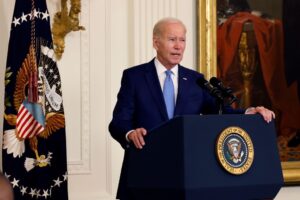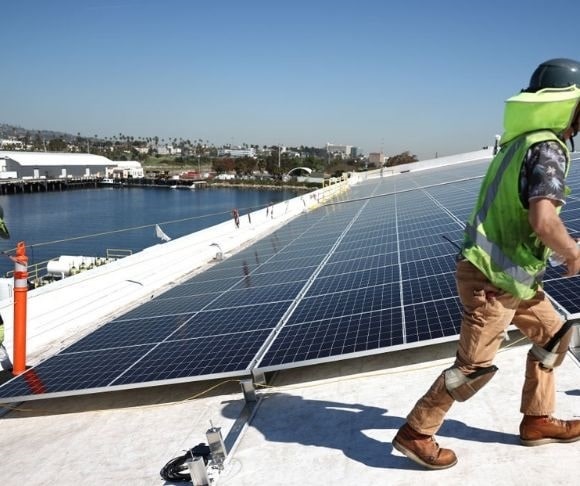Beijing is on a rampage to dominate the United States and the rest of the West, both economically and militarily, and President Joe Biden has given the Chinese adversary one more advantage in its chilling cold war with America. Congress recently passed bipartisan legislation designed to protect US manufacturers of solar panels. This reversed the president’s earlier executive order requiring the Department of Commerce not to enforce tariffs on imports of solar panels from China, so he vetoed it. Appropriate tariffs on imported Chinese solar cells and modules would allow US-produced solar panel components to be price competitive. Yet Biden said no.
Because of the veto, US solar panel producers must compete with the predatory pricing of Chinese photovoltaic cells fabricated with slave labor. Recent studies show the United States lagging in critical technologies. Nevertheless, Biden is ensuring US solar panel manufacturers will be disadvantaged in the market, depriving them of capital to invest in research and development and to achieve greater efficiencies and lower-cost production techniques.
Republicans and Democrats Decry Veto
Seldom do Republicans and Democrats find common cause. Promoting employers that have the potential to create high-paying, highly skilled jobs is one area where the two political camps agree. Additionally, strong bipartisan sentiment is aligning to put the United States in a better economic position in its competition with Beijing. The People’s Republic of China (PRC) makes no distinction between economic and military competitiveness when it comes to taking on the West. Market supremacy and military superiority are the goals in the PRC’s march to global dominance. And the White House is helping.

(Photo by Mario Tama/Getty Images)
But why? Biden’s “Message to the House of Representatives,” explaining he is returning “herewith without my approval H. J. Res. (House Joint Resolution) 39,” makes no sense. The president told Congress the United States has suffered under unfair trade practices and “has been reliant on China for solar energy products.” So, the White House wants to make sure reliance on the PRC continues? “Passage of this resolution bets against American innovation. It would undermine these efforts and create deep uncertainty for American businesses and workers in the solar industry,” Biden’s message asserted. Taking off the tariffs does remove “deep uncertainty”: The US solar panel companies will, with certainty, be unable to compete fairly with China in a market where the PRC dominates all phases of the manufacturing process.
Veto Supports China’s Dominance of the Solar Market
In the production of polysilicon, solar cells, and solar modules, China has 66%, 78%, and 72% market share, respectively. “The data also shows that Chinese production capacity at all steps of the solar panel production process is growing at a much faster rate than in other countries and has been doing so for the best part of the last two decades,” Katherina Buchholz reported for Statista. And the White House has decided to keep a good thing going for the Chinese Communist Party?
The national defense industrial base is an integral part of the overall manufacturing capability of the United States. It depends on a skilled workforce capable of developing and exploiting cutting-edge technologies for superior weapon systems to defeat adversaries like China. Unfortunately, underlying Biden’s veto is his perverse political motive to drive his “green” agenda as fast as possible, despite its devastating impact on US workers. Even members of Biden’s own party disagree. Representative Dan Kildee (D-MI) spoke out in a press release:
“Failing to stand up to those who engage in unfair trade practices hurts American workers and manufacturers. Our workers and businesses will never be able to compete globally unless we hold those who violate US trade laws accountable. The Biden administration found, in its own investigation, that Chinese companies are violating the law. Yet the president’s position, and [his] veto, fails to hold China accountable and hurts American workers.”

Joe Biden (Photo by Chip Somodevilla/Getty Images)
The losers in the White House veto are the skilled workers in the US solar panel industry. Worse, while putting America at risk, the Biden administration has done so in favor of Chinese coerced workers in the solar industry. “Some who have escaped this forced labor regime have explicitly described it as ‘slavery,'” according to a report published by the Helena Kennedy Center for International Justice at Sheffield Hallam University in England.
Self-sufficiency in producing solar panels and necessary components is crucial if the United States intends to rely on solar-generated energy. The Biden administration’s continual embrace of China, in this case helping an adversary retain an overwhelming market share, hampers US companies in their efforts to be more innovative and to compete successfully. Biden’s disapproval of H.J. Res. 39 is a veto of America.




